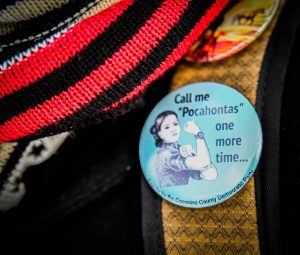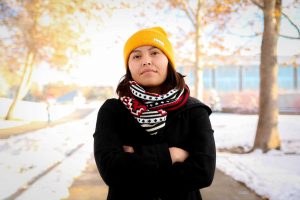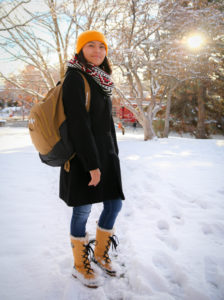In a report released by the Urban Indian Health Institute, Salt Lake City is one of the top 10 cities in the United States to hold one of the highest cases of sexual assault, domestic violence and stalking towards Native American women. Female native students at the University of Utah say that they’re not surprised.
“All I can say is that it is terrifying, especially what has happened these past three years on campus,” said Shaniah Chee, a junior anthropology major. “I feel like I am not safe walking around on campus alone, so I like to call my mom when I am walking back from spending a few hours in the library after dark.”
Chee is an enrolled tribe member of the Navajo Nation. She believes that there should be steps for the U to improve the safety of students, and especially for female native students like herself. “I think there could be more lights up to the dorms, as well as [a] local security standby during the night,” Chee said.
She also believes that opportunities to learn self-defense “would be great for native women on campus to know, just in case they need to know.”

In a study held by the National Institute of Justice, 84 percent of native women will encounter violence in their lifetimes. Efforts carried out by activists and organizations advocating for justice and policy reform have seen members of Congress tackle the issue as well. One is the Savanna’s Act.
Savanna’s Act was proposed by Sen. Heidi Heitkamp (D-ND) this past October in response to the alarming rates of sexual violence and missing cases of native women. The act would serve the interests of U.S. tribes in combating the epidemic levels of sexual assault and domestic violence towards Native American women. Currently, the act has rallied bi-partisan support and passed through the Senate Committee on Indian Affairs. It is now waiting for a floor vote.
Restoring Ancestral Winds, a Salt Lake County non-profit committed to awareness of high rates of sexual assault and violence towards Native American women in the region, encourages lawmakers and officials to support efforts of Savanna’s Act. Funded by the Department of Justice, the organization is one of the 18 tribal coalitions in the nation committed to collecting data-assessments in the state in the interests for Utah tribes. “If it does go through, it will actually give legitimacy to the efforts that we have to build a multi-jurisdictional coalition and coordinating a task-force around sexual violence,” said Moroni Benally, RAW’s coordinator of Advocacy and Public Policy.

If passed, this act would provide funding to organizations like RAW and to tribes in order to accelerate on data collection for cases. Regardless, the organization aims to release a state-wide report of data recording instances of violence against native women the late spring in 2019. At the U, Franci Taylor, the executive director of the American Indian Resource Center, said the passage of acts provide enormous support for tribal communities and members, but until local officials acknowledge the concerning data, these efforts carried by the bills will render unproductive.
“The acts need to be there to establish precedence. But until we can convince local police departments that this is a serious problem that they have to address, we’re not going to get anywhere,” Taylor said.
These concerns have sparked a movement called “Missing and Murdered Indigenous Women,” spanning across the U.S. and Canada. Activists have pushed to highlight what many believe federal and state courts have failed to do: effectively report cases affecting native women and put the work in.
Taylor thinks that education can aide mitigating the legal quandaries of prosecuting those found committing violence against native women. She believes the inherent structures of the criminal justice system has already put tribes at a disadvantage.

“How do we get to a higher level when we’ve been pushed into such a basement box? We need educated young native advocates to buck the system,” Taylor said.
Earlier this year, the annual U pow-wow dedicated its theme to Missing and Murdered and Indigenous Women. Kassaundra John, a sophomore design student, helped to centralize the pow-wow around the subject. Since then, John says that her perspective as a native woman on campus has further intensified.
John explained that she shares her friends’ frustration that men only date them based on their identity, an uncomfortable experience as a student. “My native girlfriends and stuff— we’re like yeah, some dudes only date us because they know we’re Native Americans,” she said. “It makes us feel a little degraded in a way. They only want us for this aspect of ourselves because they think it’s exotic.”
November was National Native American Heritage Month. Events mainly hosted by the AIRC to celebrate the month included meeting the U’s Lacrosse team to celebrate their inaugural spring season and Rock-your-Mocs, a week where native students don moccasins to class. John believes that the university has done minimal effort to celebrate the month. “This month has been a letdown for me,” John said. “Just because I thought we were going to have more events and more publicity about it. The U uses the name and [doesn’t] honor the people in that sense. We can use that time to do group events and have discussions about Missing and Murdered Indigenous Women. How we feel about that, ways we can come at it in a way, or bring awareness.”
Regarding the high rate of MMIW cases in Salt Lake, John acknowledges her position as a Navajo woman, especially when going to school.
“I commute to school, so I feel even more on edge knowing that demographically-wise,” she said. “I’m more likely to be raped, kidnapped or hurt. It’s scary to know that, in a way.”
m.spottedelk@dailyutahchronicle.com
The post Salt Lake City Has One of the Highest Cases of Violence Against Native American Women: Native Students at the U Believe it appeared first on Daily Utah Chronicle.
